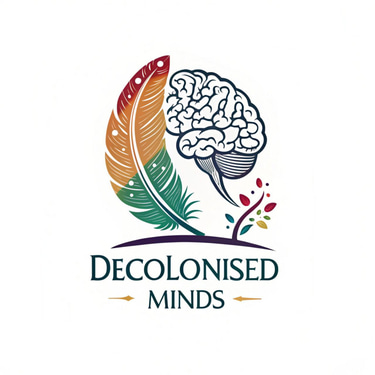Decolonised Psychotherapy: Integrating Trauma-Informed Care
Briefly discussing the integration of Trauma-Informed Care within Decolonised Psychotherapy.
By Talha AlAli, Founder of Decolonised Minds
1/21/20253 min read
Decolonised psychotherapy represents a transformative approach to mental health care, seeking to address the limitations of traditional, Western-centric psychological frameworks. It prioritises cultural humility, historical context, and the lived experiences of clients from marginalised or oppressed communities. By integrating principles of trauma-informed care, this approach provides a comprehensive, empathetic model for understanding and addressing the multifaceted impacts of individual and collective trauma.
What Is Decolonised Psychotherapy?
Traditional psychotherapy often assumes universality in human experience, reflecting Eurocentric values and practices. This has historically marginalised the experiences of Indigenous peoples, Black individuals, refugees, and other communities impacted by systemic oppression (Gone, 2013). Decolonised psychotherapy challenges these frameworks by emphasising cultural relativism and intersectionality in therapeutic work (Ratts et al., 2016).
The practice centres on understanding how colonialism, racism, and cultural erasure have shaped the mental health landscape. For example, Indigenous communities often experience disproportionately high rates of trauma, addiction, and intergenerational grief due to historical violence, forced assimilation, and loss of land and culture (Kirmayer et al., 2007). Decolonised psychotherapy validates these experiences and acknowledges the systemic nature of their root causes.
The Role of Trauma-Informed Care
Trauma-informed care (TIC) provides an essential foundation for decolonised psychotherapy. TIC recognises the pervasive impacts of trauma on individuals and communities, focusing on principles such as safety, empowerment, and trustworthiness (SAMHSA, 2014).
In a decolonised framework, trauma is viewed not only as an individual experience but also as a collective and historical phenomenon. Intergenerational trauma, such as the trauma resulting from slavery, genocide, or forced migration, is particularly relevant in this context (Kellermann, 2001). By adopting a trauma-informed lens, therapists can honour the resilience and survival strategies of clients while fostering environments that minimise the risk of retraumatisation.
Principles and Practices of Decolonized Psychotherapy
1. Cultural Humility:
Decolonised psychotherapy requires ongoing self-reflection by practitioners to understand their own biases and positionality (Tervalon & Murray-García, 1998). Unlike cultural competence, which implies mastery of another’s culture, cultural humility acknowledges that clients are the experts of their own experiences.
2. Centring Lived Experiences:
Therapy should validate and amplify clients' narratives, recognising the historical, sociopolitical, and cultural contexts that shape their mental health (Comas-Díaz, 2016). For example, storytelling, spirituality, and traditional healing practices can serve as culturally congruent interventions.
3. Acknowledging Systemic Trauma:
Therapists should understand how systemic oppression—such as racism, colonialism, and xenophobia—impacts clients’ sense of safety and well-being (Sue et al., 2009).
4. Collaboration and Empowerment:
The therapeutic relationship in decolonised psychotherapy emphasises shared decision-making and client agency. This helps dismantle hierarchical power dynamics that can replicate systemic oppression within the therapy space.
5. Community and Collective Healing:
Decolonised approaches often extend beyond individual therapy, incorporating community-based practices that recognise collective trauma and resilience (Kirmayer et al., 2011). Group therapy or culturally specific support networks may be integral to healing.
Integrating Theory into Practice
Therapists aiming to incorporate decolonised and trauma-informed practices must first commit to education and self-reflection. Practical steps include:
• Learning about historical and intergenerational trauma relevant to the populations they serve.
• Employing culturally relevant assessments and interventions tailored to the client’s unique background.
• Advocating for systemic changes that address inequities in access to mental health services.
Conclusion
Decolonised psychotherapy offers an inclusive and holistic model for understanding mental health by addressing the deep-rooted impacts of colonialism, racism, and systemic oppression. Paired with trauma-informed care, it creates a safe, empowering space for healing that validates clients’ lived experiences and cultural identities.
By embracing these principles, therapists can foster transformative healing not only for individuals but also for communities impacted by historical and systemic trauma. This paradigm shift invites all practitioners to engage in continuous learning, self-reflection, and advocacy to ensure that mental health care becomes truly equitable and inclusive.
References
• Comas-Díaz, L. (2016). Racial trauma recovery: A race-informed therapeutic approach to racial wounds. The Counseling Psychologist, 44(2), 218-232.
• Gone, J. P. (2013). Redressing First Nations historical trauma: Theorizing mechanisms for indigenous culture as mental health treatment. Transcultural Psychiatry, 50(5), 683-706.
• Kellermann, N. P. (2001). Transmission of Holocaust trauma—An integrative view. Psychiatry: Interpersonal and Biological Processes, 64(3), 256-267.
• Kirmayer, L. J., Gone, J. P., & Moses, J. (2014). Rethinking historical trauma. Transcultural Psychiatry, 51(3), 299-319.
• Ratts, M. J., Singh, A. A., Nassar-McMillan, S., Butler, S. K., & McCullough, J. R. (2016). Multicultural and social justice counseling competencies: Guidelines for the counseling profession. Journal of Multicultural Counseling and Development, 44(1), 28-48.
• Substance Abuse and Mental Health Services Administration (SAMHSA). (2014). Trauma-informed care in behavioral health services. Treatment Improvement Protocol (TIP) Series, No. 57.
• Sue, D. W., Capodilupo, C. M., & Holder, A. M. B. (2009). Racial microaggressions and their power to harm. American Psychologist, 64(3), 220-231.
• Tervalon, M., & Murray-García, J. (1998). Cultural humility versus cultural competence: A critical distinction in defining physician training outcomes in multicultural education. Journal of Health Care for the Poor and Underserved, 9(2), 11
